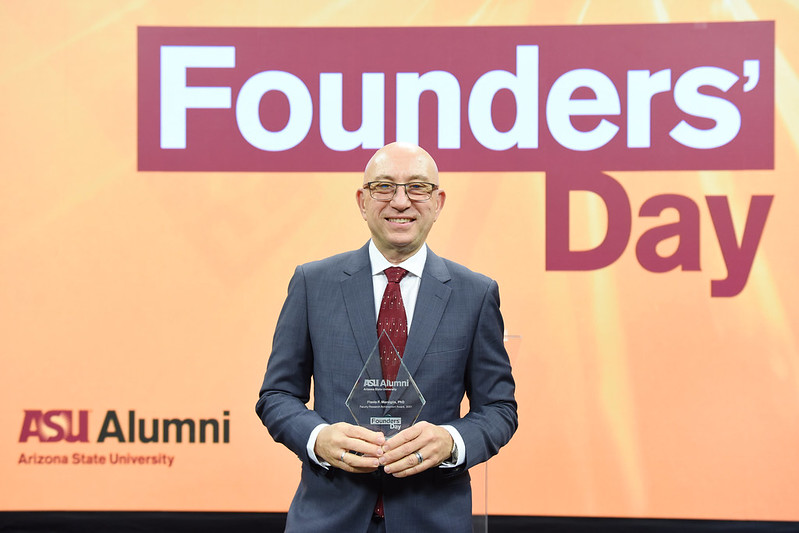
ASU Founder's Day Awards 2021
On Wednesday, March 24, 2021, the ASU Alumni Association, President Michael M. Crow, and hundreds of Sun Devils across the globe celebrated the achievements of the Founders’ Day 2021 honorees. This year, outstanding faculty honorees who exemplified the ASU Charter were recognized.
We are proud to announce and congratulate GCAHR Director, Flavio F. Marsiglia, Ph.D., on receiving the Founders' Day Faculty Research Achievement Award, given by the ASU Alumni Association. This award recognizes Dr. Marsiglia’s outstanding research and long-term dedication to excellence, innovation, and tireless efforts to promote health among vulnerable communities both nationally and internationally.
The award, which also celebrates Dr. Marsiglia’s unique scholarship, was held as a virtual celebration on March 24, 2021. Watch Dr. Marsiglia's Founders' Day Video:
In honor of Dr. Marsiglia's award, Ms. Migs Woodside, SIRC Senior Advisor, Community Engagement, conducted an interview:
How did you decide to focus on improving the health of vulnerable communities -what led you to do this- was it due to something in your background, something you saw, learned?
Many moons ago, I was responsible for the evaluation of the Drug-Free Schools program in the Cleveland Public Schools. That work made me aware of the lack of efficacious and culturally congruent prevention programs. Later on, I saw the same disconnect with HIV/AIDS prevention as the epidemic was growing and disproportionally affecting the gay and ethnic/racial minority communities. Working with community organizations in looking for solutions led me to a lifelong engagement with health equity and culturally grounded research.
Why did you select substance abuse prevention/intervention over other areas and develop the keepin’ it REAL (kiR) program? Why did you include both children and parents?
Preventing and delaying the onset of substance use in children and youth can have very positive impacts on the life of those children as they grow up and in society as a whole. Involving the parents and teachers as preventionists has helped us increase the efficacy of our prevention interventions. Adults care about the youth, they know them very well, and can provide the support children need to confront risks and live healthy and productive lives. We developed keepin’ it REAL (kiR) a school-based program, labeled a “model” under the Substance Abuse and Mental Health Administration (SAMHSA). Classroom teachers lead the program while our companion program, Families Preparing a New Generation (FPNG), engages parents. Both programs complement each other.
When you founded the Southwest Interdisciplinary Research Center (SIRC) what did you envision for the future- what was your plan?
I wanted to be part of a team of investigators and community partners working together with a common goal: to reduce and eventually eliminate health disparities. The traditional academic silo approach to research was not my cup of tea. I was looking for the energy and synergy that comes from teamwork. Working with different approaches, methods, populations, and health outcomes but sharing a common goal. That is how the SIRC family was born more than 20 years ago, connected to the Southwest and its people, working together to improve the wellbeing of our communities. The National Institutes of Health (NIH), through awards from the National Institute on Drug Abuse (NIDA) and the National Institute on Minority Health and Health Disparities (NIMHD), have supported us throughout that journey.
It is extremely unusual for anyone to establish two research centers. Why did you establish the Global Center?
Many colleagues from other countries began to request the use of our evidence-based interventions. They were particularly interested in keepin’ it REAL due to the increase of substance use among young people around the world. We felt uncomfortable just sharing the manuals and protocols designed and tested for in the US. Instead, we joined forces with colleagues from other countries to test the applicability and feasibility of interventions in countries such as Mexico or Kenya. As the global research portfolio grew, we saw a need to establish a new Center dedicated to applied global health research. Capacity building in other countries also became a priority and that is how the International Research Fellowship program began. In order for international partners to be truly engaged in the research, many of them needed additional training in research methods. The program has been very successful.
What is your dream for the future?
Recently, we started an endowment fund for the International Research Fellowship Program. My aim is for candidates from developing economies to have equitable opportunities to study and learn. The endowment will ensure that we can offer research training to early career researchers from underfunded or underrepresented countries. This training opportunity is critical for building local capacity to conduct research and to increase health equity in their home countries, and for many of these bright scholars these opportunities are often out of reach without funding. It is my hope that our newsletter readers, SIRC and GCAHR supporters, and global research colleagues will demonstrate their commitment to research and global health by donating to this endowment fund and inviting their networks to do the same. The International Fellowship Program will have an equalizing effect, and we need everyone’s help to make this dream a reality.
